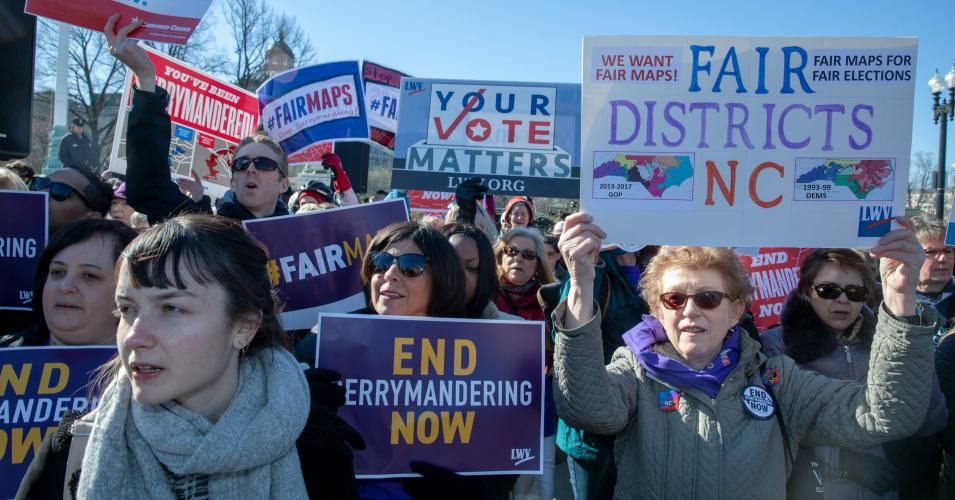Gerrymandered congressional districts come alongside a wave of GOP voter suppression laws.
In a major blow to the democratic principle that lawmakers are accountable to voters who can remove them from office, the vast majority of seats in the U.S. House of Representatives are becoming non-competitive—a trend that critics say threatens to exacerbate GOP extremism as incumbents in solidly red districts shift further right to fend off more reactionary primary challengers.
Several months into the decennial redistricting process, 335 congressional districts have been redrawn as of Thursday. Just 27 of them are considered competitive—meaning neither Democrats nor Republicans have an advantage of more than five points—according to FiveThirtyEight.
Dave Wasserman, an elections expert for the non-partisan Cook Political Report, told The Guardian on Thursday that by the time the remaining 100 boundaries are mapped, he expects just 30 to 35 seats—out of 435—to be competitive.
If as many as 94% of representatives are running in relatively safe districts, "that means that when voters show up at the polls in November to vote for their candidates, the contests will already be decided," The Guardian reported. "Their votes won't matter."
"Some of the decline in competitive seats is due to natural geographic clustering of likeminded voters," The Guardian noted. "That clumping means that when states draw new lines, it's harder to draw competitive districts. In 2012, there were 66 competitive districts, Wasserman noted. By 2020, under the same set of lines, there were 51."
However, "politicians are undoubtedly accelerating the decline in competition by distorting district lines to their advantage," the newspaper added.
Over the past year, as Common Dreams has reported, GOP-controlled states have supplemented their "tidal wave" of voter suppression laws by redrawing congressional and state legislative maps in ways that disenfranchise Democratic-leaning communities of color and give Republicans outsized representation, which could help them cement minority rule for at least a decade.
In perhaps the most egregious example of gerrymandering in the past year, Texas Republicans rigged congressional boundaries to slash the number of competitive U.S. House districts from 12 to one, doubling the number of safe GOP seats from 11 to 22 in the process. In an essay published last fall, voting rights expert Ari Berman called it "an ominous sign of things to come in other Southern battleground states," including Georgia, Florida, and North Carolina.
"Despite gaining nearly two million Hispanic residents and more than 500,000 Black residents since 2010, Republicans didn't draw a single new majority-Latino or majority-Black congressional district," Berman wrote of Texas. "Instead, the two new House seats the state gained due to population growth were given to majority-white areas in Austin and Houston."
Meanwhile, the right-wing dominated U.S. Supreme Court's ruling last week on the constitutionality of Alabama's new electoral maps gave lawmakers the green light to continue partisan and racial gerrymandering, effectively gutting what was left of the Voting Rights Act.
The diminishing number of competitive U.S. House seats has far-reaching implications. If only 6% of congressional districts are considered up for grabs, most politicians no longer have to worry about the general election and instead play to the party's base.
GOP incumbents in solidly red districts, in particular, have moved further right to avoid being unseated by more reactionary primary challengers.
According to The Guardian's Sam Levine, map-rigging has enabled Texas lawmakers to take "the state's long history of chest-thumping conservatism to new levels" in recent months.
"Republicans are steamrolling a series of extremist laws, undeterred by demographic shifts in the state favoring Democrats," wrote Levine. That includes GOP Gov. Greg Abbott, who has been burnishing "his conservative bona fides" in anticipation of a challenge from the right in this year's primary.
The lack of competitive districts "will further increase polarization... it's also a reflection of polarization, but it'll also entrench polarization more deeply," Richard Pildes, a law professor at New York University, told The Guardian.
Michael Li of the Brennan Center for Justice has stressed that if Senate Democrats reform or scrap the filibuster and pass the Freedom to Vote Act and the John R. Lewis Voting Rights Advancement Act, racial and partisan gerrymandering of the sort being pushed by right-wing lawmakers in multiple states would be outlawed.









